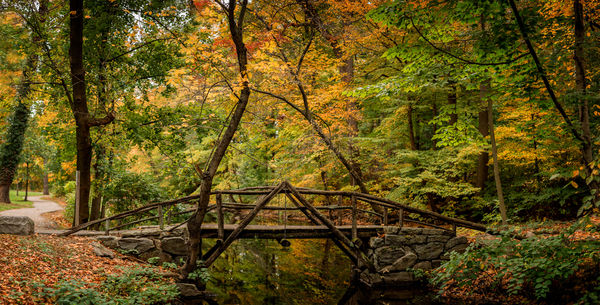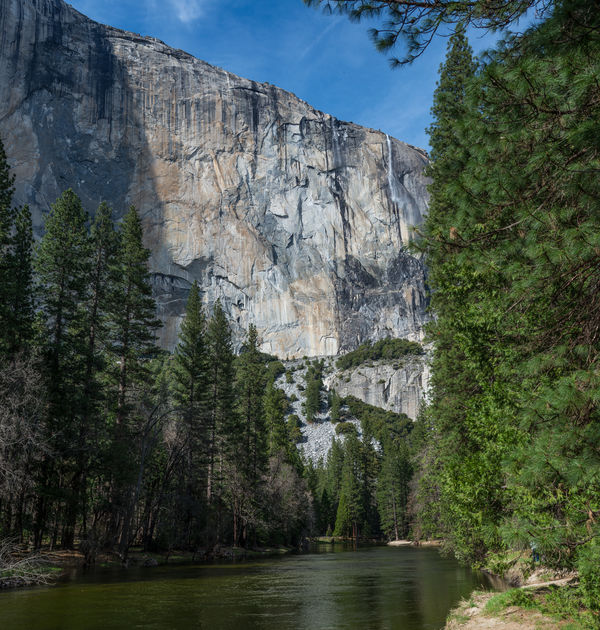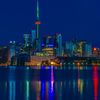Cropped vs full frame
Dec 16, 2018 12:03:40 #
sclay1234
Loc: Ocean county nj
Hello all, I just recently got a d500 , best move I ever did from my d200. I was thinking of getting a d800. My question is what would be the difference in the fx / dx is it just a bigger format.
I like to shoot landscape, nature, my daughter in her high school marching band . Is it worth the big step?
Scott
I like to shoot landscape, nature, my daughter in her high school marching band . Is it worth the big step?
Scott
Dec 16, 2018 12:22:38 #
Short answer.
If you are talking about format only and you use the lenses exclusively designed for the format for example (Nikon FX and FX lenses and Fuji X series and their lenses and not Nikon FX vs DX) then the larger format has lower noise and more limited DOF for a given FOV and aperture.
When comparing Nikon FX vs DX there is another set of consideration. There are few Nikon DX lenses and also even with the DX lenses the lens mount and flange distance were designed for the FX format.
If you are talking about format only and you use the lenses exclusively designed for the format for example (Nikon FX and FX lenses and Fuji X series and their lenses and not Nikon FX vs DX) then the larger format has lower noise and more limited DOF for a given FOV and aperture.
When comparing Nikon FX vs DX there is another set of consideration. There are few Nikon DX lenses and also even with the DX lenses the lens mount and flange distance were designed for the FX format.
Dec 16, 2018 12:35:44 #
sclay1234 wrote:
Hello all, I just recently got a d500 , best move I ever did from my d200. I was thinking of getting a d800. My question is what would be the difference in the fx / dx is it just a bigger format.
I like to shoot landscape, nature, my daughter in her high school marching band . Is it worth the big step?
Scott
I like to shoot landscape, nature, my daughter in her high school marching band . Is it worth the big step?
Scott
I shoot D800 and D810. Started with D70S, then D200, D300S, D700, D3S, and finally D800 - can't say that there is any value in the older cameras. Provided you have sharp lenses, the images from the 36 mp cameras are exceptional. Landscapes in particular benefit from the higher mp count. I just posted these images in another thread, but this should give you a taste of the detail and image quality. I used a 24-70 F2.8. The second and third images are crops of the first one. The last files are examples of landscape.
.
Dec 16, 2018 12:40:33 #
Dec 16, 2018 12:53:46 #
IDguy
Loc: Idaho
BebuLamar wrote:
Short answer. br If you are talking about format o... (show quote)
Huh? Nikon has more lenses than anyone. And probably more DX lenses. But it doesn’t matter directly because Nikon FX lenses work on their DX cameras.
The D800 lets you use any of five image areas with DX lenses. While best to use FX lenses to use the 36MP you still get nearly 20MP on the DX image area. And some DX lenses work fine with the larger image areas, all the way up to FX, at least over some of the zoom range.
That flexibilty may be changing. My new Z6 locks in the DX image area when a DX lens is attached. Since its sensor is 24MP that means you only get about 10MP with a DX lens.
Dec 16, 2018 13:21:39 #
amfoto1
Loc: San Jose, Calif. USA
I'd suggest you shoot with the new D500 for a while and not worry about "going full frame". I am certain you'll find the D500 a vast improvement over your old D200 (CMOS vs CCD and much more)!
To really get full advantage out of an FX D800 (36MP), you need to use it with FX lenses. Those are necessarily bigger, heavier and typically more expensive than DX lenses. While you can use DX lenses on the D800, doing so sort of negates the whole purpose of getting the FX camera. DX images from a D800 end up around 15MP... or less than 75% of the resolution of the D500.
The FX camera is ideal for wide angle work... while the DX camera is preferable for telephoto. Among the subjects you mention shootings, I imagine the D800 might be preferable for landscape, but the D500 might be better choice for the marching band. You mention "nature", but that can mean many things. If it's wildlife, the DX camera and telephoto lenses would be the better choice. If it's macro and close-up work, the FX camera might be a bit better choice. I use a full frame camera for some portraiture and studio work, too.
Plus, a lot depends upon what you do with your images. Unless you make big prints from your images you won't see much difference. You would probably need to print around 16x24" to start seeing the advantages of the FX format.
I suspect that a lot of FX fanboyz and fangirlz are actually the only people who see "all the goodness" from their larger format cameras. They see the advantage of FX while looking at their images "at 100%" on their computer monitors. Assuming their monitor is a typical modern type and is set to its native resolution, "100%" is actually a huge degree of magnification... viewing a 7,360 × 4,912 pixel image from a D800 at that is like looking at 6 foot by 4 foot print from about 18 or 20" away. By the time they resize the image for it's planned use, much of that "goodness" has disappeared! (Some of the above examples from D800/D810 are wonderful... but at Internet resolutions and sizes, 21MP images from D500 done with quality lenses would have looked just as good!)
The D800 is now an over 6 year old model. It has a native ISO range of 100-6400 (expandable to 50 and to 26500). It uses an anti-alias filter and can shoot at 4 frames per second. And it's 51-point AF system (15 cross type) is good to about -2EV and is "f/5.6 limited" (effecting the use of lenses with teleconverters).
The D500 is now an almost 3 year old model. It has a native ISO range of 100-51200 (expandable to 50 and to 1,640,000). It does not use an anti-alias filter and can shoot at 10 fps. It's 153-point AF system (99 cross type) is good to -4EV and is "f/8 capable" at 15 points.
Yes, the D800 has better high ISO performance . It also has more overall resolution (when used in FX mode, with FX lenses) and slightly greater dynamic range.
But in almost every other metric, the D500 is superior. You didn't mention low light shooting and will find the D500 to be MASSIVELY more high ISO capable than your D200! You also didn't indicate what lenses you have now... if many of them are DX that will influence your decision.
I assume you are looking at a used camera because the D800 is a discontinued model... It was replaced by the D810 (2014), which in turn was replaced more recently by the D850 (2017).
The D500 is a current model, so might be expected to be supported by Nikon for some years longer than a D800.
More comparisons:
https://cameradecision.com/compare/Nikon-D500-vs-Nikon-D800
https://www.imaging-resource.com/cameras/nikon/d800/vs/nikon/d500/
https://www.apotelyt.com/compare-camera/nikon-d500-vs-nikon-d800
Ultimately, I'd suggest you spend more time with your D500 and learn to get the best out of it first, before adding another camera. I suspect you won't really need the FX camera... or the additional cost of FX lenses to use on it. But, who knows! Personally I use both full frame and APS-C cameras for different purposes. For what I shoot, I use the APS-C about 95% of the time.
To really get full advantage out of an FX D800 (36MP), you need to use it with FX lenses. Those are necessarily bigger, heavier and typically more expensive than DX lenses. While you can use DX lenses on the D800, doing so sort of negates the whole purpose of getting the FX camera. DX images from a D800 end up around 15MP... or less than 75% of the resolution of the D500.
The FX camera is ideal for wide angle work... while the DX camera is preferable for telephoto. Among the subjects you mention shootings, I imagine the D800 might be preferable for landscape, but the D500 might be better choice for the marching band. You mention "nature", but that can mean many things. If it's wildlife, the DX camera and telephoto lenses would be the better choice. If it's macro and close-up work, the FX camera might be a bit better choice. I use a full frame camera for some portraiture and studio work, too.
Plus, a lot depends upon what you do with your images. Unless you make big prints from your images you won't see much difference. You would probably need to print around 16x24" to start seeing the advantages of the FX format.
I suspect that a lot of FX fanboyz and fangirlz are actually the only people who see "all the goodness" from their larger format cameras. They see the advantage of FX while looking at their images "at 100%" on their computer monitors. Assuming their monitor is a typical modern type and is set to its native resolution, "100%" is actually a huge degree of magnification... viewing a 7,360 × 4,912 pixel image from a D800 at that is like looking at 6 foot by 4 foot print from about 18 or 20" away. By the time they resize the image for it's planned use, much of that "goodness" has disappeared! (Some of the above examples from D800/D810 are wonderful... but at Internet resolutions and sizes, 21MP images from D500 done with quality lenses would have looked just as good!)
The D800 is now an over 6 year old model. It has a native ISO range of 100-6400 (expandable to 50 and to 26500). It uses an anti-alias filter and can shoot at 4 frames per second. And it's 51-point AF system (15 cross type) is good to about -2EV and is "f/5.6 limited" (effecting the use of lenses with teleconverters).
The D500 is now an almost 3 year old model. It has a native ISO range of 100-51200 (expandable to 50 and to 1,640,000). It does not use an anti-alias filter and can shoot at 10 fps. It's 153-point AF system (99 cross type) is good to -4EV and is "f/8 capable" at 15 points.
Yes, the D800 has better high ISO performance . It also has more overall resolution (when used in FX mode, with FX lenses) and slightly greater dynamic range.
But in almost every other metric, the D500 is superior. You didn't mention low light shooting and will find the D500 to be MASSIVELY more high ISO capable than your D200! You also didn't indicate what lenses you have now... if many of them are DX that will influence your decision.
I assume you are looking at a used camera because the D800 is a discontinued model... It was replaced by the D810 (2014), which in turn was replaced more recently by the D850 (2017).
The D500 is a current model, so might be expected to be supported by Nikon for some years longer than a D800.
More comparisons:
https://cameradecision.com/compare/Nikon-D500-vs-Nikon-D800
https://www.imaging-resource.com/cameras/nikon/d800/vs/nikon/d500/
https://www.apotelyt.com/compare-camera/nikon-d500-vs-nikon-d800
Ultimately, I'd suggest you spend more time with your D500 and learn to get the best out of it first, before adding another camera. I suspect you won't really need the FX camera... or the additional cost of FX lenses to use on it. But, who knows! Personally I use both full frame and APS-C cameras for different purposes. For what I shoot, I use the APS-C about 95% of the time.
Dec 16, 2018 15:22:17 #
IDguy wrote:
Huh? Nikon has more lenses than anyone. And probab... (show quote)
There are only 26 DX lenses vs 77 FX lenses. FX lenses are not optimized for DX body. The flange distance which was chosen for the FX camera back in 1959 is too long for the DX format.
Dec 16, 2018 15:50:46 #
Dec 16, 2018 15:53:46 #
The advice to continue with your existing camera is good advice
a) you need a larger format for very large prints only. The difference cannot be seen on a computer screen.
B) many many people are ditching their large cameras because of weight issues as they get older and also the 'lightweight' of mirrorless large format cameras that are appearing now 'apparently' give them a comparable results - subjective.
C) there are people who assume very expensive has to be better...Which may be true if the head and eyes behind the lens is also commanding high prices for their prints.
D) your post processing skills have to be 'as good' as your camera skills....that is back to the PC and see A) above.
Save pennies it it coming up to Christmas.....
have fun
a) you need a larger format for very large prints only. The difference cannot be seen on a computer screen.
B) many many people are ditching their large cameras because of weight issues as they get older and also the 'lightweight' of mirrorless large format cameras that are appearing now 'apparently' give them a comparable results - subjective.
C) there are people who assume very expensive has to be better...Which may be true if the head and eyes behind the lens is also commanding high prices for their prints.
D) your post processing skills have to be 'as good' as your camera skills....that is back to the PC and see A) above.
Save pennies it it coming up to Christmas.....
have fun
Dec 16, 2018 23:13:22 #
sclay1234 wrote:
Hello all, I just recently got a d500 , best move I ever did from my d200. I was thinking of getting a d800. My question is what would be the difference in the fx / dx is it just a bigger format.
I like to shoot landscape, nature, my daughter in her high school marching band . Is it worth the big step?
Scott
I like to shoot landscape, nature, my daughter in her high school marching band . Is it worth the big step?
Scott
I have both types of cameras. I use the Nikon D500 crop for wildlife and fast scenes. I use the Nikon Z7 for landscape, urban landscape and people. If I want a wider shot I grab the Z7 or a smaller, tighter shot I grab the D500. It's a matter for preference for the shot. However, in general, the full format cameras may have a better sensor for low light, which is often landscape anyway.
Dec 17, 2018 04:06:06 #
I own a D500 and and 3 Canon full frame cameras. While you will fit more into the image with a full frame, you can also get a good amount into images from a D500. The D500 is well suited for photos of your daughter and nature. You may also get great landscape photos from the D500, but, because of the larger full frame sensor, you will get wider landscape photos. The D500 is a very complex camera, a best in class. I'd learn all you can about the D500 before considering buying a full frame camera.
Dec 17, 2018 05:27:29 #
BebuLamar wrote:
Short answer. br If you are talking about format o... (show quote)
Because of the circle of confusion factor, the smaller the sensor (smaller CoC) the shallower the depth of field for a given focal length/subject-camera distance/aperture. If you change your distance to get similar framing (composition) - moving back with the smaller sensor - THAT will give you more depth of field for a given focal length and aperture.
If cameras are in the same generation and technology, the camera with the larger pixel (photosites) will have less noise. But there is a caveat - you need to compare apples to apples. A 12 mp image from a crop sensor camera viewed at 100% will have more noise than a 12 mp full frame when uncropped images from each are printed to the same size. However, the 12mp crop camera image will have less noise than a 36 mp image from a full frame camera at 100%, because the pixels in the 36 mp camera are smaller. But the 36mp image at 100% is quite a bit larger than the 12 mp image. To be fair, you would either need to resample the 12 mp image to 36mp or downsample the 36 mp image down to 12 mp, and the noise will get averaged, making it far less noisy.
All Nikon lenses (excluding large format) have the same rear focus plane distance - regardless of whether it is an FX or a DX lens. Before there were special DX lenses, all Nikons used the same lenses. Like with view camera lenses, the only consideration between a 210 mm lens "designed" for 4x5 and one designed for 8x10 was the rear field of projection - or the image circle - FX lenses have image circles that slightly exceed the size of the FX sensor, but greatly exceed the DX sensor. The exception to this are the tilt/shift lenses that actually cover a larger image circle, roughly equivalent to medium format - to allow for lens movements. All Nikon DSLRs at the beginning were DX format. So Nikon designed the cameras to be able to utilize the existing range of lenses, which were all able to cover the full frame of 35mm cameras, and subsequently FX cameras. You will never see a Nikon full frame lens labeled as FX, but you will see lenses labeled as DX, indicating that it will not cover a larger format.
So if the OP wants to move to a larger format with higher resolution, he should. Image quality will greatly improve, in regards to both resolution and noise. Downsampling the high mp image always helps noise as well.
Dec 17, 2018 06:43:42 #
Scott, personally, I'd never want to use a crop sensor camera for my serious work. I did purchase one just for grins and to, possibly, be able to provide some direct hands-on experience with that format help to folks here. Otherwise, it's not something I'd want to shoot. In fact, my personal preference for photographing landscapes is a 4x5.
--Bob
--Bob
sclay1234 wrote:
Hello all, I just recently got a d500 , best move I ever did from my d200. I was thinking of getting a d800. My question is what would be the difference in the fx / dx is it just a bigger format.
I like to shoot landscape, nature, my daughter in her high school marching band . Is it worth the big step?
Scott
I like to shoot landscape, nature, my daughter in her high school marching band . Is it worth the big step?
Scott
Dec 17, 2018 07:38:44 #
sclay1234 wrote:
Hello all, I just recently got a d500 , best move I ever did from my d200. I was thinking of getting a d800. My question is what would be the difference in the fx / dx is it just a bigger format.
I like to shoot landscape, nature, my daughter in her high school marching band . Is it worth the big step?
Scott
I like to shoot landscape, nature, my daughter in her high school marching band . Is it worth the big step?
Scott
The ability to crop--there are pictures in the pictures--
as a preceding post demonstrated.
Dec 17, 2018 08:03:38 #
sclay1234 wrote:
Hello all, I just recently got a d500 , best move I ever did from my d200. I was thinking of getting a d800. My question is what would be the difference in the fx / dx is it just a bigger format.
I like to shoot landscape, nature, my daughter in her high school marching band . Is it worth the big step?
Scott
I like to shoot landscape, nature, my daughter in her high school marching band . Is it worth the big step?
Scott
No.But if you want to maximize the IQ and provide a path to a second body, invest in Nikkor FX glass. If you really want to go FX now, invest in a good used D700. Yes, it is “only” 12mp, but has fantastic IQ with top quality lenses.
If you want to reply, then register here. Registration is free and your account is created instantly, so you can post right away.

















